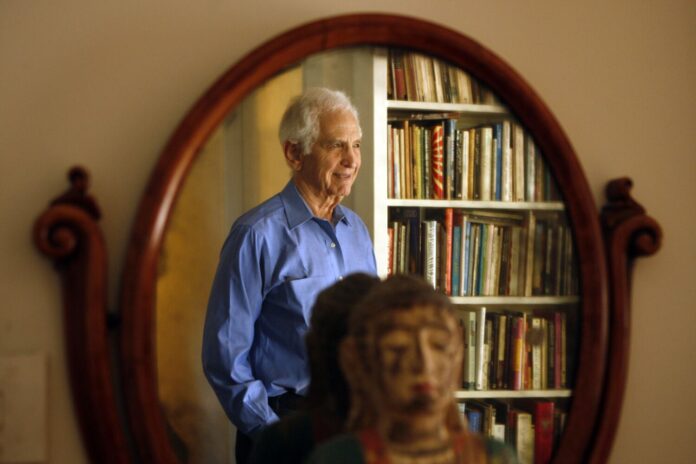This Content Is Only For Subscribers
Earlier than Edward Snowden and Julian Assange, there was Daniel Ellsberg.
The prototypical fashionable whistleblower, Ellsberg barreled into historical past in 1971, when he leaked the extremely labeled historical past of American involvement in Vietnam that grew to become referred to as the Pentagon Papers. His unprecedented act drew again the curtain on the largely hidden world of U.S. policy-making, triggered court docket battles over freedom of the press and led to calamity for the presidency of Richard M. Nixon.
Thought of a hero by some and a traitor by others, Ellsberg introduced in February that he had inoperable pancreatic most cancers and solely months to stay. He died Friday at his Bay Space house in Kensington, his household stated in a press release. He was 92.
In a letter to supporters about his prognosis, Ellsberg wrote that he felt “fortunate and grateful” for his life.
“I had each purpose to assume I’d be spending the remainder of my life behind bars,” the previous protection analyst wrote of his choice to share the papers with the New York Occasions and different publications. As an alternative, he spent the a long time after the dismissal of the federal government case towards him as a author, lecturer and antinuclear activist. He remained an ardent critic of the federal government, significantly throughout the 1990-91 Persian Gulf Struggle and the 2003-11 Iraq Struggle. He inspired whistle-blowing and was a outstanding advocate of Snowden, who leaked top-secret paperwork concerning the Nationwide Safety Company’s home surveillance practices, and Assange, the founding father of Wikileaks.
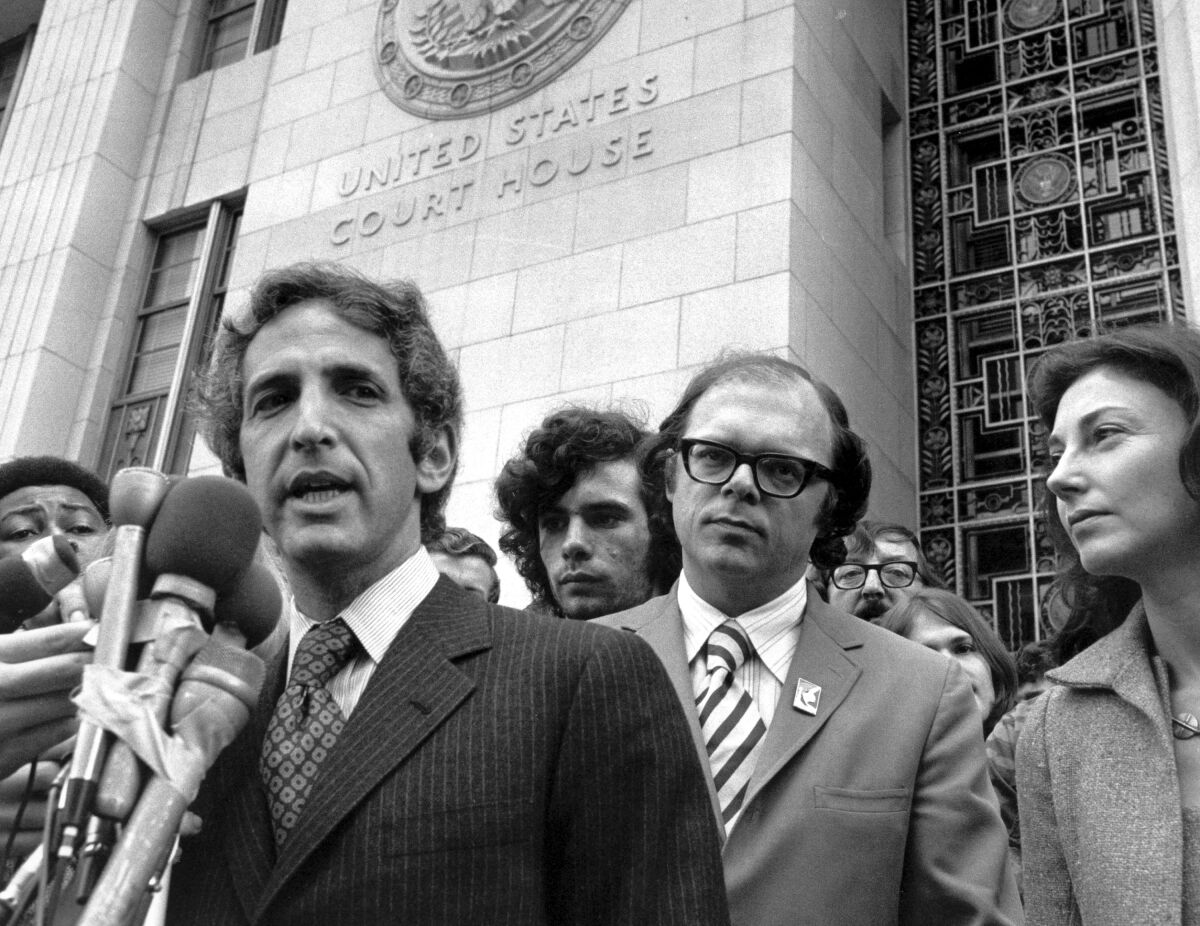
Daniel Ellsberg speaks to reporters Jan. 17, 1973, outdoors the Federal Constructing in Los Angeles as his co-defendant, Anthony Russo, heart proper, appears to be like on.
(Related Press)
“One thing just like the Pentagon Papers must be popping out a number of occasions a yr,” Ellsberg advised a Georgetown College symposium in 2017.
The 7,000-page, 47-volume report advised how 4 successive presidents, starting with Truman, had lied concerning the scope of U.S. involvement and prospects for victory in Vietnam. Ellsberg, a hawkish former Marine lieutenant and Harvard PhD, had helped produce the examine for Robert McNamara, who, as Protection secretary for Presidents Kennedy and Johnson, had been the chief architect of the Vietnam Struggle. Ellsberg hoped that publishing the papers would rapidly finish the unpopular conflict.
After the New York Occasions started to publish excerpts from the papers, Ellsberg grew to become a wished man. He eluded an FBI manhunt for 2 weeks whereas he provided copies of the purloined report back to greater than a dozen different main U.S. newspapers, together with the Los Angeles Occasions.
He finally surrendered and was indicted on 12 federal counts, together with conspiracy, theft of presidency property and espionage. He was let loose in 1973 after disclosures of presidency misconduct led a federal court docket choose in Los Angeles to declare a mistrial.
A sophisticated man of nice mind and ego, Ellsberg led a exceptional life even earlier than he grew to become infamous by the Pentagon Papers. By coincidence or design, he witnessed seminal occasions of the Vietnam period and labored carefully with a variety of its key figures.
He met Henry Kissinger at Harvard years earlier than Kissinger, as Nixon’s nationwide safety advisor, would condemn Ellsberg as “probably the most harmful man in America.” Ellsberg began work on the Pentagon in 1964, as one in every of McNamara’s “whiz children,” on the day of the Gulf of Tonkin incident, a confrontation with North Vietnam that Johnson used to acquire authority to wage open fight in Vietnam.
Ellsberg went to Vietnam a yr later, the place he gained an insider’s view of the conflict from two of its legendary figures: Gen. Edward Lansdale, who had impressed the character of Pyle in Graham Greene’s “The Quiet American,” and John Paul Vann, the previous Military officer and outspoken critic of U.S. insurance policies in Vietnam, whose exploits had been detailed in Neil Sheehan’s Pulitzer Prize-winning ebook “A Shiny Shining Lie.” Sheehan was the reporter Ellsberg would later flip to for assist in publicizing the Pentagon Papers.
Releasing the papers didn’t convey the swift finish to the conflict that Ellsberg had hoped for: Official U.S. involvement in Vietnam didn’t stop till 1973, two years after their publication within the New York Occasions. However Ellsberg’s act did have dramatic penalties.
The papers indelibly altered the nationwide political context, revealing a deep-seated cynicism towards the American public that eroded confidence within the authorities.
The leak additionally spurred the creation of the Plumbers, a clandestine White Home unit tasked with investigating and discrediting Ellsberg that went on to commit crimes for Nixon’s reelection committee, together with the Watergate burglaries.
Its operatives, led by G. Gordon Liddy and Howard Hunt, broke into the workplaces of Ellsberg’s Beverly Hills psychiatrist in the hunt for compromising materials. They later dedicated the crime that may set up them as bunglers of historic proportions: the break-in on the Democratic Nationwide Committee headquarters on the Watergate complicated in Washington, D.C. The following scandal engulfed Nixon, forcing his resignation on Aug. 9, 1974.
“The Pentagon Papers affair, in brief, led on to the unraveling and remaining disintegration of the Nixon presidency,” Pentagon Papers historian David Rudenstine concluded in his 1996 ebook “The Day the Presses Stopped.”
Ellsberg spent the subsequent a number of a long time as a author, lecturer and antinuclear activist. He supported Snowden, whose 2013 leak of an enormous trove of Nationwide Safety Company paperwork made him probably the most well-known whistleblower of the twenty first century.
Ellsberg’s path from warrior to iconic pacifist started in Chicago, the place he was born April 7, 1931. He grew up in Detroit, the second of three youngsters of middle-class Jewish mother and father who transformed to Christian Science. His father was a structural engineer; his mom was a musician who made Daniel observe piano as much as eight hours a day, starting when he was 5. He continued the routine even after her dying in a automobile accident when he was 15.
A full scholarship allowed him to attend Harvard, the place he studied economics and political science. He completed third in his class and earned a bachelor’s diploma in economics in 1952. He then studied at Cambridge College on a Woodrow Wilson Fellowship earlier than returning to Harvard in 1953 for a grasp’s diploma in economics.
At Harvard he met Carol Cummings; they married and had two youngsters, Robert and Mary, earlier than divorcing. Along with his older youngsters, he’s survived by his second spouse, Patricia Marx; their son, Michael; and several other grandchildren.
Swayed by the film heroics of John Wayne, Ellsberg in April 1954 waived his pupil draft deferment and signed up for 2 years within the Marines. He grew to become an knowledgeable marksman and commanded a rifle firm within the 2nd Marine Division at Camp Lejeune, N.C. He prolonged his tour throughout the Suez Disaster in 1956 within the hope that he would lead troops in fight, however the U.S. didn’t intervene militarily.
“At the moment in my life,” he wrote in his 2002 memoir “Secrets and techniques,” “I cared an excellent deal about how effectively we fought, however very a lot much less about whom we fought, or why. That was for the president to resolve.”
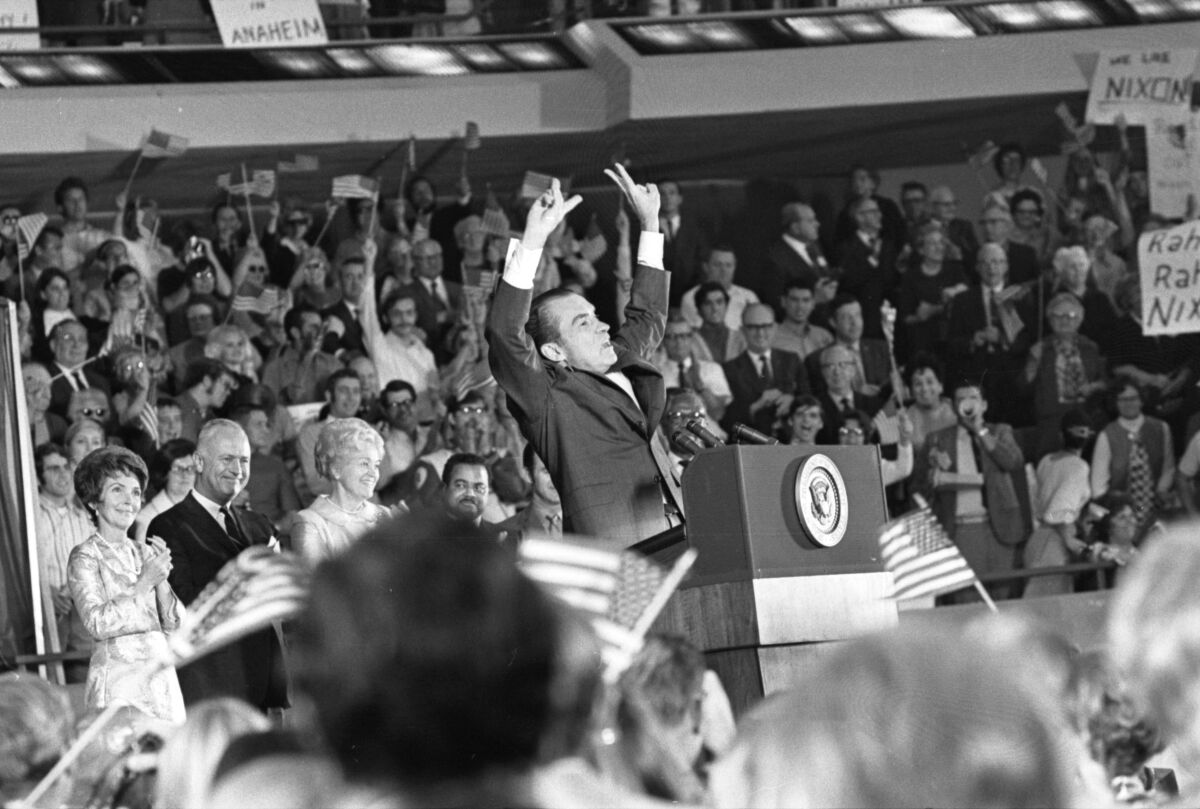
President Nixon makes victory indicators as he addresses a 1970 rally on the Anaheim Conference Middle.
(Boris Yaro / Los Angeles Occasions)
That perspective, molded by World Struggle II and the Chilly Struggle, remained with him for one more decade.
After finishing his army service, Ellsberg earned a doctorate in economics at Harvard in 1959. That very same yr he joined Rand Corp., the Santa Monica-based assume tank, often traveled to Washington for high-level conferences and took half in discussions that helped form Kennedy’s responses to the Cuban Missile Disaster in 1962.
In 1964, he moved to Washington to hitch the employees of John T. McNaughton, assistant secretary of Protection for worldwide safety below McNamara. He helped McNaughton handle the torrent of data pouring into the Pentagon about U.S. actions in Vietnam. He supported the Johnson administration’s Vietnam insurance policies and generally helped McNaughton concoct “10 various lies” to assist McNamara clarify troublesome conditions associated to the conflict.
In 1965, Ellsberg went to Vietnam to conduct political work as a part of an interagency group.
What he noticed there turned him towards the conflict: South Vietnamese troops who averted fight, corrupt officers who stole provides supposed for civilians, the mindless burning of villages and the taking pictures of unarmed peasants suspected of Vietcong ties. Pacification wasn’t working, and casualties — American and Vietnamese — had been mounting.
By 1966 he concluded that U.S. efforts in Vietnam had been going nowhere. When he left the nation the next yr, he was obsessive about telling the reality about what was occurring in Vietnam.
Regardless of sunny public pronouncements concerning the progress of the conflict, McNamara additionally had grown disillusioned. By mid-1967, the Protection secretary was satisfied that U.S. coverage in Vietnam had failed.
“The thought that students would certainly want to discover these questions as soon as the conflict had ended was more and more on my thoughts,” McNamara wrote in his 1995 ebook “In Retrospect: The Tragedy and Classes of Vietnam.” He requested McNaughton to start gathering paperwork for an goal examine on the causes of the conflict.
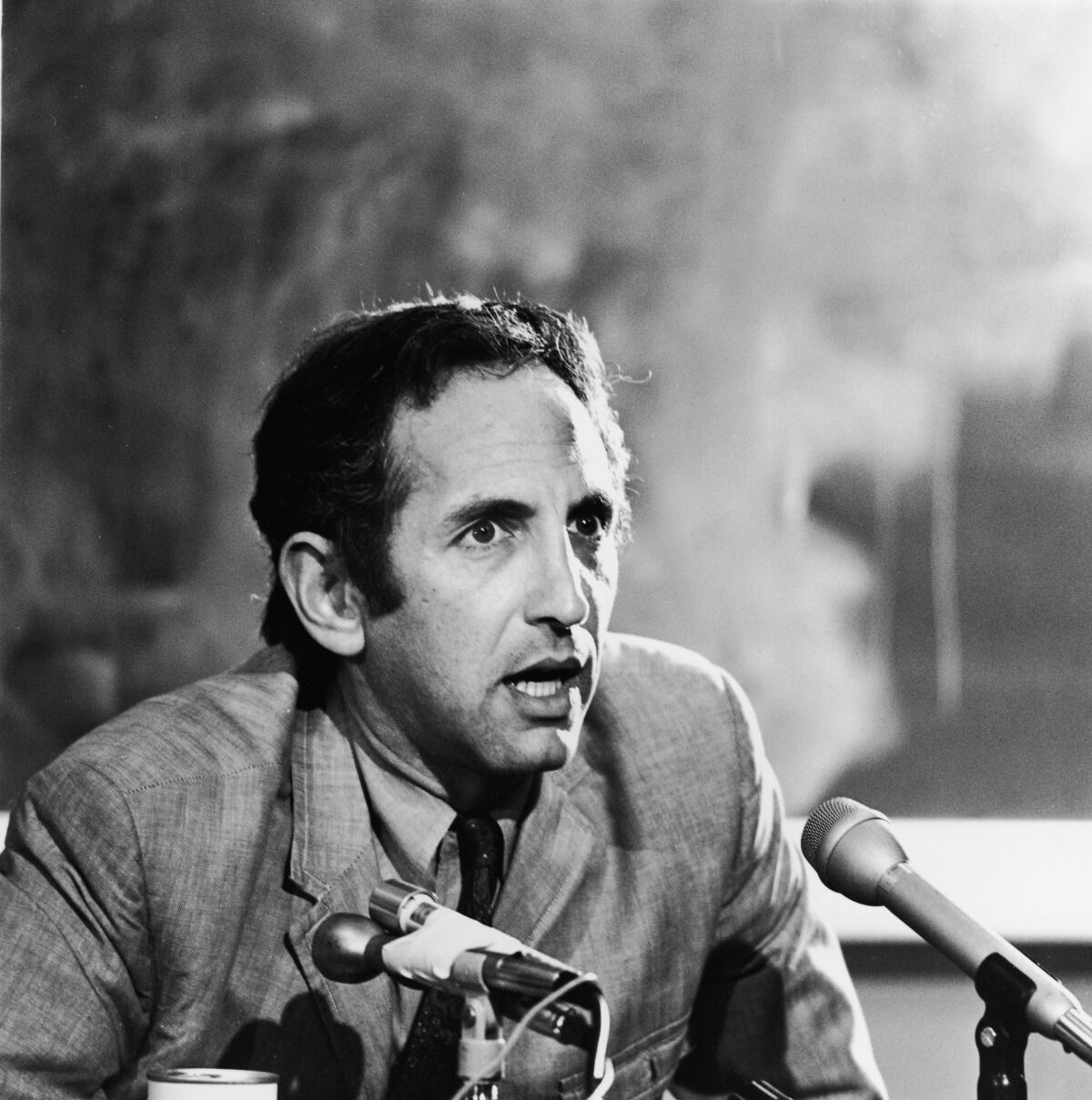
Ellsberg speaks at a information convention within the Nineteen Seventies.
(Hulton Archive / Getty Pictures)
Ellsberg was invited to hitch a group of researchers that may conduct a examine of Vietnam decision-making from 1945 by 1967. In all, 36 researchers labored 18 months to finish the report. Ellsberg, who contributed to a bit on Kennedy’s actions in 1961, would grow to be one of many few to learn it in its entirety.
Though he was not working straight for the federal government, Ellsberg as a Rand analyst maintained an inside observe by a sequence of high-level assignments. After McNamara resigned to move the World Financial institution in 1968, Ellsberg grew to become a guide to a bunch evaluating Vietnam choices for the brand new secretary, Clark Clifford. He later suggested Kissinger on an analogous undertaking for the Nixon administration.
In February 1968, Ellsberg discovered that Military Gen. William C. Westmoreland, commander of U.S. forces in Vietnam, was requesting a rise of 206,000 troops, which might convey the full to greater than 700,000. Decided to forestall what he noticed as a harmful escalation, Ellsberg leaked to Sen. Robert F. Kennedy a labeled report on Westmoreland’s request.
It was additionally leaked to the New York Occasions, sparking outrage in Congress, the place some members started to name for the repeal of the Gulf of Tonkin decision that had given the president such broad authority to wage conflict.
The response shocked Ellsberg and taught him a lesson: “Leaking could possibly be a patriotic and constructive act.”
Ellsberg acted on his newfound perception quickly after the Westmoreland story ran. In March 1968, he divulged labeled stories and paperwork to Sheehan, who was by then the New York Occasions’ Pentagon reporter. Sheehan wrote an article saying that the U.S. had drastically underestimated the enemy’s energy earlier than the Tet offensive of January 1968, which produced a U.S. dying toll of greater than 1,000.
By the top of March, Johnson introduced an finish to the bombing in North Vietnam and shocked Individuals together with his choice to not search a second full time period in workplace.
In 1969, whereas steeped in Vietnam research for Rand and Kissinger, Ellsberg requested Pentagon officers for permission to take some volumes of the McNamara examine again to his workplace in Santa Monica. That summer season, he started to learn the key historical past of the Vietnam Struggle.
He discovered that, way back to 1948, American advisors, impressed by the favored help loved by Communist Occasion chief Ho Chi Minh, had warned towards an intervention in Vietnam. However U.S. involvement step by step escalated below three presidents: Eisenhower, Kennedy and Johnson.
Ellsberg rapidly reached the conclusion that the Vietnam Struggle had by no means been a civil conflict, as historians had normally described it, however “a conflict of international aggression, American aggression.” He started to imagine that the conflict had been improper from the beginning — not simply strategically misguided however immoral.
The wheels started to show in Ellsberg’s head when he learn a report within the Los Angeles Occasions concerning the Military’s choice to drop prices towards eight Inexperienced Berets charged with killing a suspected Vietnamese double agent. Studying between the strains, he concluded that the White Home had exerted stress on the Military to desert the case in an effort to cowl up a homicide and stop the general public from studying the true info behind it. Outraged, he vowed that he was not going to be “a part of this mendacity machine, this cover-up, this homicide, anymore.”
His ideas turned to the examine hidden in his protected at Rand. He now noticed it as “7,000 pages of documentary proof of mendacity, by 4 presidents and their administrations over 23 years, to hide plans and actions of mass homicide.” He determined he may now not maintain it below wraps, although in releasing it, he would betray shut associates who had trusted him to maintain it confidential.
That very same day he referred to as Anthony Russo, a former Rand colleague who had usually inspired Ellsberg to go public.
When Ellsberg received to Russo’s residence, he advised him concerning the McNamara report and requested if he had entry to a photocopy machine. Russo supplied the assistance of his girlfriend, Lynda Sinay, who owned an promoting company in Hollywood.
The copying began on the night of Oct. 1, 1969, and continued each night time for a number of weeks. Twice, the operation was interrupted by cops who got here to Sinay’s workplace when she by chance set off a silent alarm, however for probably the most half, the copying proceeded with out mishap.
“I assumed I’d go blind from the inexperienced gentle of the Xerox machine,” stated Ellsberg, who did many of the copying. He was assisted by Russo, Sinay and even his youngsters, Robert, then 13, and Mary, 10. Robert helped run the copy machine, whereas Mary trimmed pages to take away the phrases “Prime Secret” stamped throughout them.
By November, Ellsberg had copied sufficient of the report to supply it to Sen. J. William Fulbright (D-Ark.), chairman of the Senate Overseas Relations Committee. Ellsberg prompt that Fulbright launch the papers throughout a listening to on the conflict. Initially excited by the prospect of utilizing the papers to criticize the conflict, Fulbright in the end determined towards placing them out, telling Ellsberg that the papers had been “solely historical past.”
Ellsberg tried to curiosity different members of Congress, together with Sens. George McGovern and Charles Mathias, however all turned him down for numerous causes. Ellsberg then thought of one other technique.
On March 2, 1971, he met with Sheehan and supplied a have a look at the papers. He allowed Sheehan to take notes however refused to let him make copies of the report with out a assure that the New York Occasions was going to publish it.
“I didn’t desire a copy mendacity round in an establishment that wasn’t going to make use of it,” Ellsberg defined in a 2021 interview with the Nation.
They organized to fulfill 10 days later in order that Sheehan may evaluate a set of the purloined papers that Ellsberg had saved at his brother-in-law’s Cambridge, Mass., residence.
When Ellsberg left city for just a few days, he gave Sheehan a key to the residence and allowed him to maintain studying the papers whereas he was away. The reporter seized the chance to have the papers duplicated and surreptitiously shared copies together with his editors. Quickly a group of reporters and editors had been holed up in a New York Metropolis resort studying the papers, marking excerpts and writing articles. Sheehan, cautious of shedding his scoop, stored Ellsberg in the dead of night concerning the New York Occasions’ plans till simply earlier than the primary installment was printed, on June 13, 1971.
“It was simply luck that he didn’t get the whistle blown on the entire rattling factor,” Sheehan, in a New York Occasions interview that was printed after his 2021 dying, stated of Ellsberg’s earlier leaks to the senators.
Claiming that publication of the examine endangered nationwide safety, the Nixon administration went to court docket to restrain the New York Occasions from making additional disclosures — the primary time the federal government had tried to forestall the press from publishing data it possessed. The U.S. Supreme Courtroom in the end dominated within the Occasions’ favor, permitting the newspaper to renew publishing stories on the examine.
Ellsberg finally provided copies of the examine to greater than a dozen different newspapers, together with the Los Angeles Occasions, Washington Publish, Boston Globe and Christian Science Monitor. Earlier than surrendering, he gave Walter Cronkite an interview for the “CBS Night Information” during which he stated he hoped the “fact will free us of this conflict.”
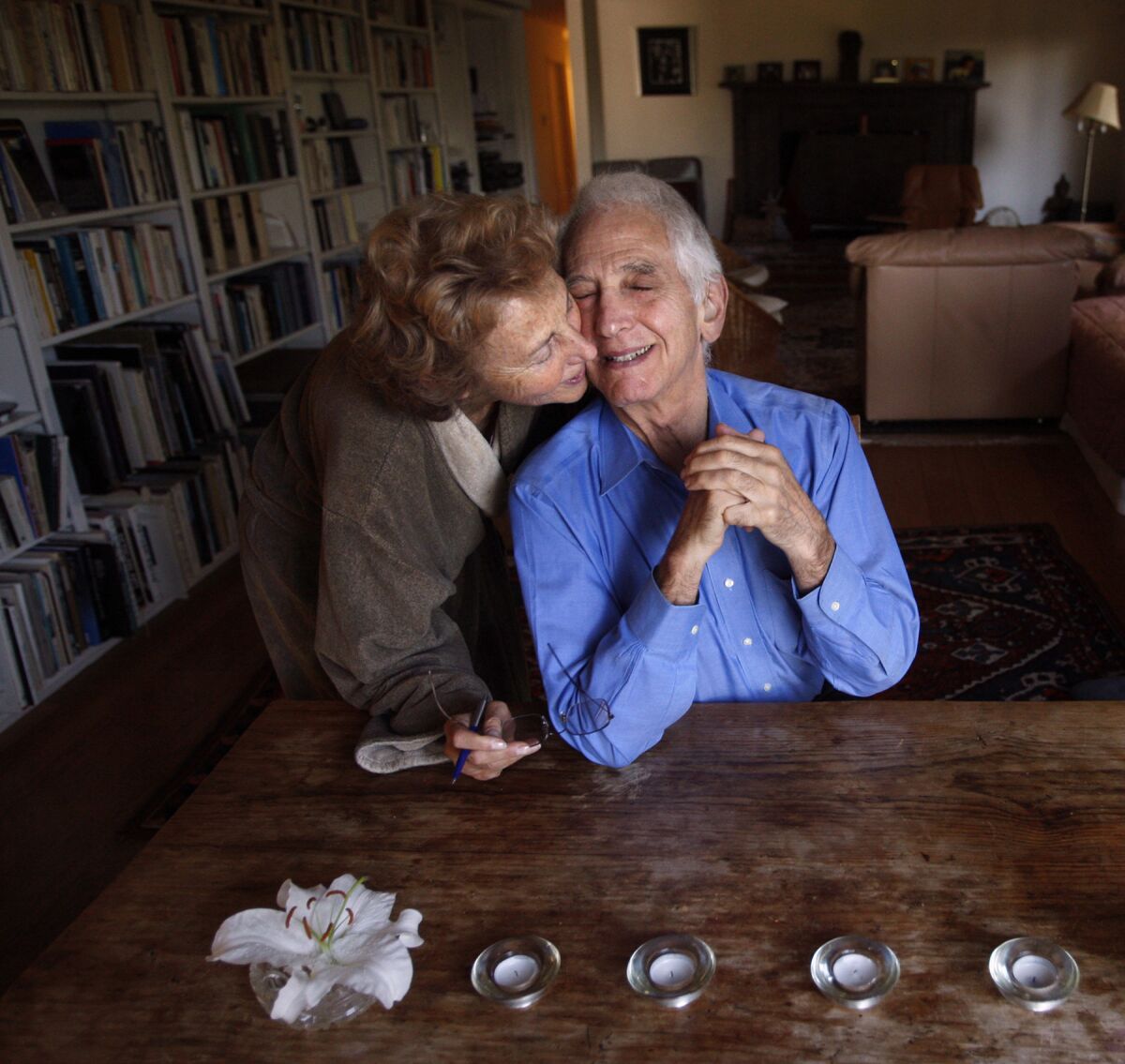
Ellsberg together with his spouse, Patricia Marx Ellsberg.
(Genaro Molina / Los Angeles Occasions)
It galled Nixon that the press, by no means his good friend, was turning Ellsberg right into a hero. Within the Oval Workplace tapes, the president is heard telling Kissinger and Atty. Gen. John Mitchell tips on how to cope with the scenario.
“Don’t fear about his trial,” he stated. “Simply get the whole lot out. Attempt him within the press. Attempt him within the press. The whole lot, John, that there’s on the investigation, get it out, leak it out. We wish to destroy him within the press. Press. Is that clear?”
On Sept. 3, 1971, the Plumbers broke into the Beverly Hills workplaces of Dr. Lewis Fielding in the hunt for Ellsberg’s confidential recordsdata however discovered nothing helpful and received away with out incident.
The aim of the crime didn’t come to gentle till the Watergate scandal started to bloom. When the choose within the Ellsberg case was knowledgeable of the Fielding housebreaking, the information was introduced within the courtroom. That night time, Nixon’s prime two lieutenants — John Ehrlichman, his home affairs chief, and Chief of Employees H.R. Haldeman — resigned, as did Richard Kleindienst, the performing lawyer basic. White Home counsel John Dean was fired.
Ehrlichman, Haldeman, Mitchell and Dean later went to jail for conspiring to hinder the Watergate investigation, as did Egil “Bud” Krogh, who headed the Plumbers unit.
Quickly after, Ellsberg and the press discovered of different improprieties: that the White Home had supplied the publish of FBI director to Decide Matthew Byrne, who was presiding over the Ellsberg case, and that the FBI had wiretapped Ellsberg’s conversations with a former Protection Division colleague.
After announcing these developments “greater than disquieting,” Byrne dismissed the case on Might 11, 1973. Ellsberg went free. Every week later, the Senate Watergate hearings started.
Nixon, in his 1978 memoir, defended the break-in at Ellsberg’s psychiatrist’s workplace.
“At present it appears improper and extreme,” Nixon wrote. “However I don’t settle for that was as improper or extreme as what Daniel Ellsberg did, and I nonetheless imagine that it’s a tragedy of circumstances that Bud Krogh and John Ehrlichman went to jail and Daniel Ellsberg went free.”
Woo is a former Occasions employees author.

